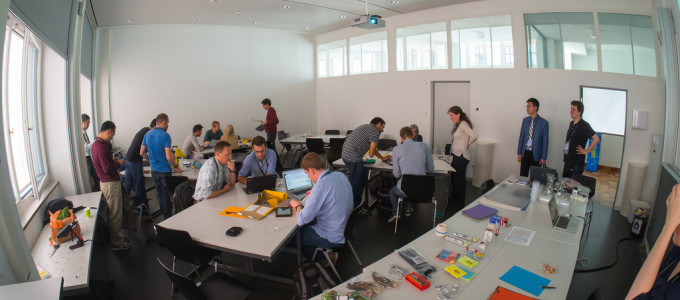The SenCity Workshop @ Ubicomp 2013
By Sarah Gallacher
The SenCity workshop took place on Monday 9th September 2013 at Ubicomp in Zurich Switzerland. Over 20 participants arrived on the day, bringing their own skills and interests. They included designers, social scientists, technologists and sensor experts to name a few. The aim of the workshop was to explore the use of sensing technologies for visually resurfacing some of the hidden dynamics of the city by providing a collaborative and facilitated environment for applied research and creative exploration. The participants were split into groups and two sensing kits were provided to groups. The first kit was the Smart Citizen environmental sensor kit and the second was the custom built SenCity kit built by Vaiva Kalnikaite.
Groups were given time to brainstorm what they wanted to sense in the city, how they were going to do it, where they were going to do it and what the sensor kit should look like in the city environment. Various materials were provided to build sensor kit casings. The groups showed great creativity and the final results ranged from typical “black-box” style casings to duck shapes and even an alien! The groups then left the workshop room to explore Zurich for several hours and try out their creations. On their return the collected data was plugged into a visualisation platform, developed by Hans-Christian Jetter, and each group presented a story of their day including their ideas, final sensor casing design and their data story of where they went in Zurich, what they sensed and what the visualisations represented.
It was interesting to note how several groups created animal or human-like sensor casings that were aimed at encouraging public participation. Indeed, those groups experienced positive curiosity from the public whereas other groups with more “black-box” like designs commented on the negative suspicion of members of the public. Another interesting behaviour was the expectation of a reward by some members of the public who had interacted with one of the sensor kits.
These outcomes along with the collected data and other experiences from the workshop are central to our on-going research agenda investigating the challenges of citizen sensing in urban environments. We wish to develop technologies and tools to empower the citizens of urban spaces through sensing and sense making in a bottom-up fashion. Interesting questions arise as to how to encourage participation especially in the long-term and what the benefits are to the citizens who participate? As the trends of big data and “smart infrastructure” continue we want to give city inhabitants the means and opportunities to impact and drive change.
Pictures by Danny Harrison (http://www.flickr.com/photos/dbpharrison/)



